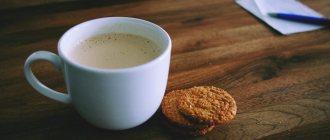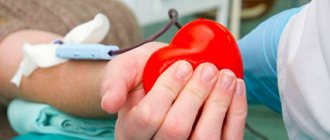Caffeine contained in coffee is the most common psychoactive substance in the world. It stimulates the central nervous system, increases alertness and concentration, improves mental and physical performance, and fights fatigue.
Against the background of such effects, the human body gets used to a qualitatively new way of life and over time can no longer do without drinking coffee or other products containing caffeine. Caffeine addiction develops.
Quitting coffee suddenly can cause unpleasant withdrawal symptoms, but there are some long-term benefits. So this solution has its pros and cons.
How much caffeine do you consume
90% of American adults drink caffeine every day. Recommended How much caffeine do you consume? the daily permissible dose is 300 mg. A glass of medium roast coffee from Starbucks contains 310 mg of caffeine from Pike Place Roast. And a serving of lightly fried is already 475 Blonde Roast mg. So if you drink several cups a day, by the evening you'll be ingesting nearly 1,000 mg of caffeine.
According to Caffeine: How much is too much? According to the Mayo Clinic, caffeine doses greater than 400 mg per day can cause side effects such as headaches, insomnia, stomach upset and anxiety. And at least 14% of US residents regularly take this dose.
“The exact amount of caffeine that would be definitively harmful to health is difficult to pinpoint,” says Maggie Sweeney, a researcher at the Johns Hopkins Institute of Medicine. It all depends on your lifestyle and your genes. In rare cases, large amounts of it can increase Does an energy drink cause a transient ischemic attack? the likelihood of mini-strokes (called transient ischemic attacks), when the blood supply to the brain is interrupted for a short time, says neurologist Chris Winter.
It's really strange to watch a 21-year-old guy who has already had several strokes at his age. As a rule, such people abuse energy drinks. So caffeine overdose definitely exists.
Chris Winter
When I was studying math, I consumed almost 1,200 mg of caffeine per day - every day, from 2001 to now. Its half-life is Serum Caffeine Half-lives: Healthy Subjects vs. Patients Having Alcoholic Hepatic Disease is approximately six hours. So if you take 300 mg at noon, you'll have 150 mg left in your body by 6 p.m., about 75 mg at midnight, and so on. So my body was obviously under constant influence for almost two decades.
Your heartburn will disappear.
According to the National Digestive Diseases Coordinating Center, about 20% of Americans suffer from sour belching at least once a week.
And 7% of Americans experience heartburn every day - a burning sensation in the chest and a sour taste in the throat.
If you are one of those Americans, then eliminating coffee from your diet may solve this problem; coffee is one of the top ten causes of heartburn according to WebMD.
An increase in gastroesophageal fluid outflow has been noted in studies. Even decaffeinated coffee causes the same increase; leading researchers say it is a completely different component in coffee than caffeine that is causing the problem.
This may be because coffee is acidic and increases stomach acid levels. Decaffeinated coffee and regular coffee increase acidity levels more than caffeine alone.
Whatever the reason, coffee is linked to heartburn, so cut it out and see if you feel better. See also my other tips on how to deal with heartburn and indigestion.
What are the side effects?
I realized that I was overusing caffeine after talking with Trevor Kashy, a professional nutritionist with an extensive practice and a PhD in biochemistry. His patients, at the beginning of treatment (and he treats both completely ordinary people and Olympic athletes), completely give up coffee for two weeks: thus Kashi finds out the power of caffeine's effect on stomach upset, sleep problems, bloating or lethargy. According to Kasha and Sweeney, coffee is a strong gastrointestinal irritant.
Caffeine blocks the action of adenosine, a chemical naturally produced in the brain that helps the body fall asleep. In addition, it also causes the release of cortisol, a hormone that exacerbates the stress response and disrupts normal wakefulness and sleep patterns. So giving up caffeine leads to their improvement.
Maggie Sweeney
Numerous studies of EEG and ocular correlates of circadian melatonin phase and human performance decrements during sleep loss prove the benefits of sleep for both the mind and body. Trevor Kashi believes that these benefits outweigh all the advantages of coffee.
Chris Winter argues that improving the quality of sleep is not only beneficial in itself, but also has a beneficial effect on eating habits. This is probably why I lost several kilograms in a week after giving up coffee. The Effects of Experimental Sleep Restriction on Caloric Intake and Activity Energy Expenditure study published in 2013 by the American College of Chest Physicians found that people who sleep poorly take in nearly 600 more calories per day than those who sleep poorly. sleeps normally at night.
When you're tired due to lack of sleep, levels of the hormone ghrelin, which triggers hunger, jump, and leptin, which signals fullness, decreases. By giving up coffee and other energy drinks, you will kill two birds with one stone: you will feel less hungry and reduce your sugar intake.
Chris Winter
Doctors Kashi and Sweeney often hear from patients that they feel more balanced after giving up coffee. According to Sweeney, the fact that coffee causes anxiety was confirmed by Caffeine abstention in the management of anxiety disorders researchers back in the eighties. And the American Psychiatric Association has officially recognized the anxiety disorder that occurs with caffeine abuse.
Who shouldn't drink it anyway?
There are certain categories of people who need to limit coffee, or better yet, give it up completely. These conditions are described below:
- Pregnancy. Caffeine penetrates the feto-placental barrier and causes many negative effects in the fetus. This substance also has a harmful effect on the tone of the uterus. Scientists have proven the following adverse effects of drinking coffee during pregnancy: stillbirth, miscarriage, premature birth, fetal growth retardation, intrauterine fetal hypoxia.
- Breast-feeding. Caffeine can also pass through breast milk, increasing the risk of developing diseases of the cardiovascular and nervous systems in the child.
- Depression and anxiety disorders. Caffeine aggravates the course of any mental disorders.
- GERD. Coffee increases the incidence of this disorder and aggravates its course if present.
- Gastritis and peptic ulcer of the stomach and duodenum. Coffee increases the effect of hydrochloric acid in gastric juice on the affected gastric mucosa.
- Taking medications . Caffeine is incompatible with such groups of medications as antidepressants, antibiotics, and glucocorticosteroids.
- Sleep disorders. Coffee further disrupts the structure of this complex physiological process.
- Hypertension and symptomatic arterial hypertension. Caffeine can increase blood pressure levels. Increase in blood pressure even by a few mm. rt. Art. in such conditions, the risk of developing myocardial infarction or stroke increases several times.
There are other contraindications to coffee. Drinking the drink against the background of these conditions is fraught with aggravation of the general condition and the development of irreversible complications that can lead to death (perforation of an ulcer, heart attack, stroke, etc.).
How to quit once and for all
Trevor Kasha has a way to determine whether a patient is ready to give up caffeine. “Just tell someone to give up coffee forever and look at their face,” says the doctor. You will see a flash of existential dread. And Maggie Sweeney points out the common signs of withdrawal - headaches, fatigue and irritability - to prove to patients that they have become addicted and to convince them to finally detox.
The good news is that rejection doesn't have to be downright hard. Sweeney offers a way to gradually wean yourself off coffee. Just start mixing your regular decaf coffee drink. "If you're a heavy coffee drinker, it may take a few weeks to wean yourself off this energizing substance," she says. Drinking plenty of water or herbal tea during detox may also help.
Chris Winter found my method of simply stopping drinking coffee to be “too painful.” But I found it more effective. Trevor Kashi, on the other hand, agreed with me: “You spend one weekend with herbal tea and aspirin, but then you’ll be clean,” he said. I'm glad I finally quit coffee. And now I see how my life without him becomes much better.
How to give up coffee - 6 tips
Due to withdrawal symptoms, caffeine restriction is an extremely unpleasant procedure that most people are unable to cope with.
In some countries, the “withdrawal syndrome” that occurs when caffeine is stopped is even identified as an independent disease, for which appropriate methods of treatment and rehabilitation have been developed.
Below are several recommendations that can help you stop drinking coffee forever almost painlessly and smooth out the course of the “withdrawal syndrome”:
- Slowly reduce your intake. Every day you should reduce your drink intake by 3-5% so that the body begins to gradually adapt. This will reduce the likelihood of side effects.
- Drink enough water. According to American scientists, dehydration increases the symptoms of withdrawal syndrome. It is recommended to increase the intake of ordinary water by 10-20%.
- To sleep more. It is recommended to sleep at least 7-9 hours, this will help cope with side effects.
- Workout. Despite the development of weakness and drowsiness after withdrawal, you should maximize physical activity and consume more fruits and vegetables rich in vitamins.
- Switch to other drinks. There are many drinks to replace coffee. For example, black or green tea also contain caffeine, but its dose is 3-6 times lower than in regular coffee. This will help cope with the manifestations of addiction.
- Switch to decaffeinated coffee. An alternative is to replace one serving of regular coffee per day with a decaffeinated coffee drink (available from regular stores).
Thus, slowly reducing the amount of caffeine in the daily diet, in combination with other tips, helps reduce the severity of withdrawal symptoms.
Anxiety, depression or irritability.
If you're stopping caffeine because it's making you depressed, anxious, or even causing a panic attack, the last thing you want to hear is that abstaining from caffeine can cause anxiety and depression, too.
According to the Johns Hopkins Therapy teachings I mentioned earlier, 13% of people develop “significant impairment” while abstaining from caffeine.
For some, it was impossible to leave home, work or responsibilities... pretty serious side effects, eh?
Less serious is the irritability you may feel when everyone or everything around you gets on your nerves.
You will have pearly white teeth again.
Since coffee is acidic, over time it washes away tooth enamel. In the long term, this means that your teeth won't look as good and may even start to decay.
And the tannin contained in coffee is applied to the enamel, making your smile charmingly yellow.
According to studies comparing the effects of tobacco and coffee on tooth enamel, people whose teeth were darkened by coffee were no longer resistant to brushing and were more likely to become discolored after dental whitening.
If your teeth still remain dark after coffee, despite all your efforts to whiten them, you can always try oil pulling.
It promotes oral hygiene, and even though there is no scientific evidence that it whitens teeth, fans of the practice claim that it does help.
Your hormones return to normal.
Eliminating caffeine is just one of many dietary changes recommended to balance hormones.
Hormonal imbalance affects many people today, thanks to poor diet, pollution and stress.
Hormones that are out of whack have a big impact on your overall health, so you should remember some positive changes when you stop drinking coffee.
For example, the caffeine in coffee increases stress hormones, including cortisone. In fact, after you drink coffee, your cortisone levels in your body are identical to those when you are under great stress.
High cortisone levels are linked to mental problems such as memory loss, as well as insulin resistance, which can ultimately lead to diabetes.
Coffee may also affect human growth hormone, which helps maintain healthy muscles and bones in adults.











